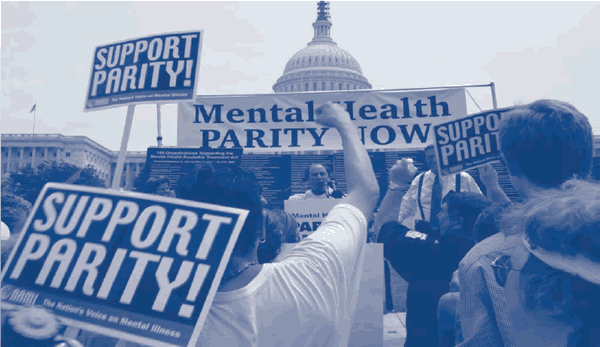
(12-8-17) Every time we take a step forward, it seems we get knocked two steps back.
Getting mental health treatment remains difficult in our country despite passage of The Paul Wellstone and Pete Domenici Mental Health Parity and Addictions Equity Act of 2008 (MHPAEA) that requires parity in health insurance coverage of mental health and physical health benefits.
That’s the findings of a survey the National Alliance on Mental Illness has released based on an online survey conducted in 2016 to examine what happened when individuals with insurance sought mental health care. The study, which drew responses from 3,177 individuals, is called The Doctor Is Out.
When trying to find a provider, respondents reported the most severe problems as follows: 1. Providers were not accepting new patients (55% psychiatrist, 45% therapist); or 2. Providers were not accepting their health plan (56% psychiatrist, 11% therapist).
An earlier study had found that only a little over half of all psychiatrists will accept insurance – compared to close to 90% of physicians in other medical specialties. It’s even worse if you depend on Medicare and Medicaid because psychiatrists accept patients at “significantly lower rates than other physicians do.”
That’s especially troubling when you consider that Medicaid is the biggest payer for mental health services.
Why is finding a psychiatrist who will accept insurance so difficult?
This trend has several possible explanations. One possibility is low reimbursement rates compared with primary care and specialty medical care physicians. An additional factor may be that many psychiatrists have solo practices and do not have the time or capacity to complete paperwork requirements necessary for insurance reimbursement.
Another possible explanation is that severe shortages in the supply of psychiatrists may create such demand for their services that they have limited incentive to accept insurance. In other words, the numbers of people willing to pay privately for psychiatric services may be sufficient to reduce the need to seek reimbursement through private insurance or public programs such as Medicare and Medicaid. Related to this, some psychiatrists may also be selective about whom they are going to treat. Limiting one’s practice to patients who have the capacity to pay may exclude those individuals who have fewer resources, are sicker and are more complicated to treat.
What’s this mean:
1. That despite promises of parity, individuals with mental illnesses often can’t get help even with insurance.
2. Psychiatrists would prefer to treat patients willing to pay for their services out-of-pocket, which reduces the number of doctors willing to help the indigent and deal with the sickest of the sick.
3. If you have schizophrenia and are homeless, addicted and broke, the only chance you have for any sort of care is through community mental health services that are already typically understaffed and underfunded. And you had better get ready for another round of cuts to Medicaid.
NAMI concludes its short report with five smart recommendations, but it is frustrating that parity, which was supposed to make certain that mental health was treated the same as physical health, is simply not working as Congress intended.
While I don’t post comments on my author’s page, please tell me on my facebook page if you have had trouble getting help. I’ll pass your stories and complaints along to former Congressman Patrick Kennedy who championed parity and continues to push for ways to make it work.
(Thank you NAMI employees Sita Diehl, Ron Honberg, Angela Kimball and Dania Douglas for spotlighting what too many individuals with mental illnesses have discovered when they have sought help and believed they could find a psychiatrist and their insurance would cover it.)



